CoinIdol to Hold Public Trial of Scammers Who Stole $10 mln in Bitcoin
Updated: Jul 19, 2020 at 22:22
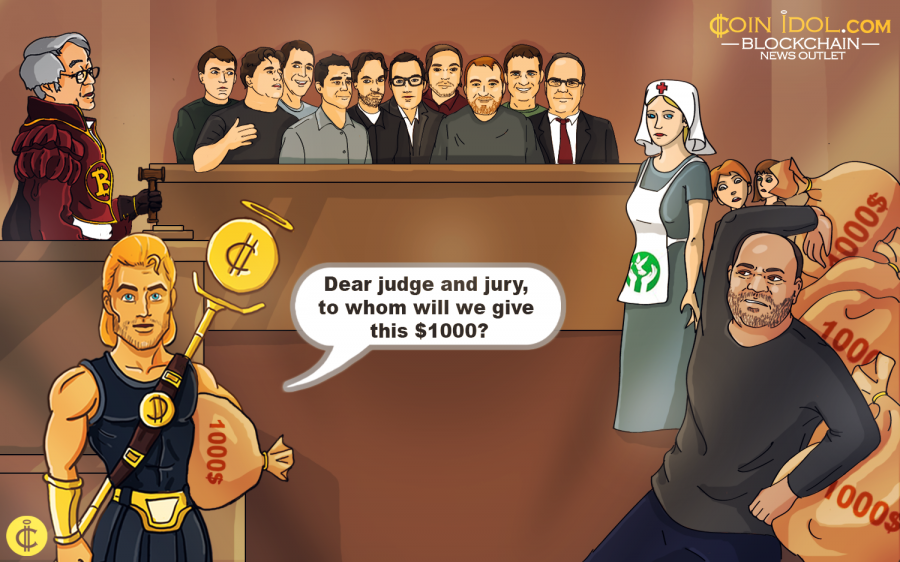
Can we force scammers who have stolen up to $10 mln in Bitcoin to pay $1,000 to charity?
Coinidol.com News Outlet invites every member of the crypto-community to join the jury in the case, where scammers have allegedly stolen about $10,000,000.
There is no unified regulation for ICOs and no-one controls when they are used in fraud schemes. However, scammers and fraudsters turn to different world mass medias, as well as advertising and PR-agencies and ask them to write articles or display banners to advertise them. Often players in the market agree to such jobs without checking all the details, and as a result, help fraudsters to steal money from other people's pockets.
The story we want to tell you today is about how we had to refuse to advertise the company of a suspicious client after our own study into their reliability. We found out that they have already stolen $10,000,000. By the time we had figured it out, they had already sent us $1,000.
We wanted to send that money back, but isn’t it odd to return stolen money to a thief who has taken that money from other people? However, we are not going to keep this money either. We don’t want stolen money. We believe that these funds should be sent to charity. But we want to set a precedent of market self-regulation without police to verify our decision with the votes of the community, just like we do to verify the block in the Bitcoin network. We want to act according to the decision of the crypto community.
We ask you to participate in an open vote on whether to:
1. Return money to Jawad Yaqub, whether he is a scammer or not,
2. Not to return money to Jawad Yaqub, but rather send it to a charity organization.
We kindly ask you not to vote if you haven’t read the whole text to the end and understood the details of the situation. Together with you, there will be ten honorary members of the jury, whose responsibilities also include sharing their opinion in public, who will participate in the vote.
The honorary members of the jury are:
- Charles Hoskinson, former CEO of Ethereum;
- Richard Kastelein, Founder of The-blockchain.com;
- Aleksandar Matanovic, Co-Founder of Serbian Bitcoin Association;
- Roger Ver, Bitcoin Jesus, founder of Bitcoin.com;
- Rupert Hackett, Board Director at Australian Digital Currency Commerce Association;
-
Bas Wisselink, Co-Founder at NXT Foundation;
-
Eric Grill, CEO of CoinOutlet, a Bitcoin ATMs company;
- Stephen DeMeulenaere, Co-Founder of Coin Academy;
- Ivan Tikhonov, Founder of Bits.media;
- Mike Lorrey, co-creator of the cryptocurrency, predecessor of Bitcoin (joined the jury on March 9).
Removed from the jury due to changing their mind to support the trial:
- Nathan Wosnack, Founder and President of Ubitquity LLC (removed from jury, March 9);
- Richard Kastelein, Founder of The-blockchain.com (removed from the jury, March 9).
The vote will end on March 17, 2017, GMT, and the results will be published on Monday, March 20, 2017, with comments from the jurors on why they have voted the way they did.
The voting formula is: the results of the community voting and honorary jury will be summed 50/50. We will take further action depending on the results of the voting.
Below we give you the history of our investigation, which was conducted during the half of the year from summer 2016, when we first met with Jawad Yaqub while writing this article about the project DeOS by Razormind.
The news seemed to be interesting. We interviewed experts in the market and published the text with their comments and concerns about the controversial nature of the project. Take a good look at George Basiladze’s comment on the legality of their actions.
However, soon after publication, Jawad Yaqub said that there was a lot of negative criticism on the Internet and all that has nothing to do with the reality, and that he is ready to prove it. He wanted to order a series of "sponsored" articles on Coinidol.com.
The team of Coinidol agreed to investigate the situation and help restore the project’s reputation. In such a spirit we began to do our job.
Investigating DeOS project by Razormind
On August 22, 2016, we received a payment of $1,000 for a series of interviews and sponsored articles that we agreed to publish for Razormind. According to the plan, the articles were intended to reveal the logic of the product, technical details, conduct interviews with management and developers, and to make a comparison with other competitors. A banner was planned to be placed along with the publishing of the first article on the project.
We began the investigation and gathering of information about the project. A closer study of the http://razormind.co.uk and http://razormind.net/ web pages, as well as a study of existing materials about the DeOS project. DeOS is described as a distributed operating system based on Blockchain technology, so the study promised to be interesting.
Promising project or a skillful plagiarism
Almost immediately, we found an existing operating system called DEOS, which was developed by Sony Computer Science Laboratories, Inc in 2003. The whitepaper from 2009 of that project can be found
here. The first information on Razormind’s DeOS project is dated only in 2015.
Their account on Github https://github.com/razormind has no code for DeOS that is available to be explored, rather only three other forked projects.
We asked Jawad a question about the other project, as it is very strange that there are two operating systems with the same name, and the first of them was developed by a well-known tech giant Sony. Moreover, the logo for DeOS from Razormind is quite similar to the logo of another operating system - Debian, a Linux-based OS.

However, Jawad assured us that he had no idea about the OS from Sony and none of Sony’s developers worked on the project. And that additionally, there are no connections with the logo of Debian. It is quite strange that the developers never checked in Google search the name of their OS.
Also, we have noticed some comments under articles on the Cointelegraph.com website:
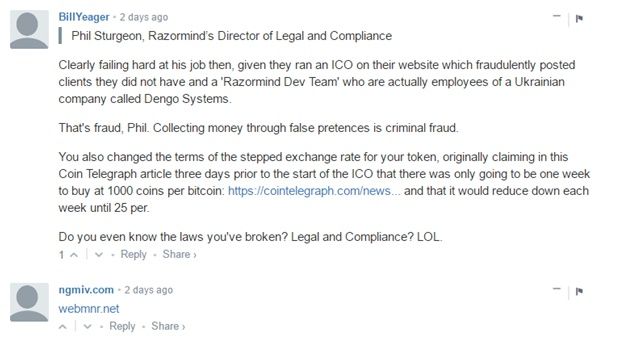
One of our authors received a private message from a reader on LinkedIn:
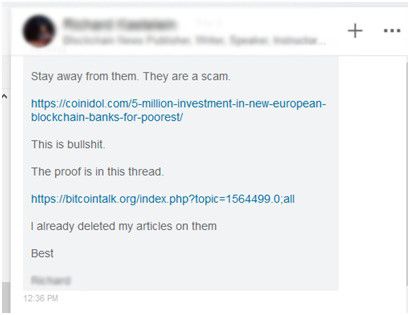
Tech gaps
On September 16, 2016, Jawad sent us a letter with answers to our questions, however, most of the questions weren’t fully answered or answers weren’t clear. Though, we received some of the answers.
It was argued that DeOS is an operating system that can run directly on the "hardware". Moreover, we were surprised by the statement that DeOS can be run on the iPad or iPhone, as Apple wouldn’t approve that. But we were told that DeOS can be also used as an application-client for other operating systems such as iOS.
We also received confirmation that the source code of the project is currently unavailable but that the company plans to open-source it later.
Also, the company shared its grand plans with us:
“Our initial plans include investing in new offices, a blockchain lab, 10 bitcoin ATMs, and an internship program for Belfast. Hiring of staff and purchasing of BTMs has begun with 2 expected in the city the week of 3rd October.
Our plan in early 2017 is to launch two blockchain banks - one in Belfast, and another in Paris, and perhaps invest 10 BTMs in Paris as well.”
We asked about the technical details of the problem of scaling, but received no technical explanation, results of research or any other specific details.
We asked about the promises of the capability to store large data while synchronizing on mobile devices. But received no specific answer.
“Yes, that amount transferred through the system should be fine, and won't affect transaction speed.”
On the question of the protection of users’ data, we received a reply that TLS/HTTP2 is used for transfers, and that data is encrypted with AES-256. Thus, no one can access the data without the user's private key. It seems a perfectly reasonable solution, but it is always a double-edged sword: What happens if users use it to distribute child pornography, for example?
The answer we received was a little surprising:
“Strong laws and severe penalties exist to stop child pornography, and also to stop people using digital systems to store and spread them. DeOS Apps are vetted by the DeOS Foundation, and I'm *certain* they will put in place safeguards to prevent this.”
Does this mean that the DeOS Foundation has an access to the user’s encrypted data? Or how are they going to solve such a situation? And even if they detect that such data exists, how are they going to make changes in the Blockchain?
Nevertheless, we had a large volume of correspondence, but received no specific information. That is why we were unable to release even the first article. No use to make a blank advertising material – as we definitely are not interested in it, as well it’s not the best solution for the client either. So we tried to get some more facts:

We spent a lot of time to get any specific information but were unable to receive it. No a single screenshot of the existing programs, apps, or code. No whitepapers. Nothing. So we started a joint conversation with the technical expert of CoinIdol.com, Janis Kalnis.
At that moment, our mission was to find evidence that DeOS isn’t a scam. We had to check the codes, prototypes, developers team, that should have famous experts, as it is a very difficult task to develop such a complicated OS.
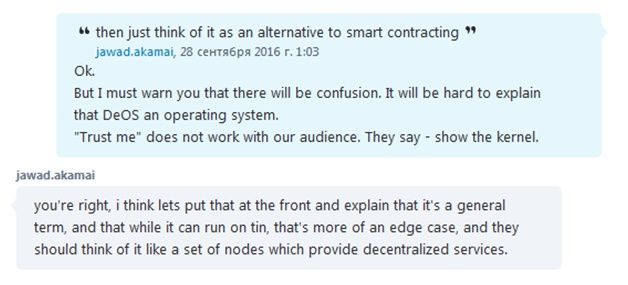
Moreover, there should be dozens of developers and employees to develop such a project. However, the registry of Razormind in UK Companies House with number NI636534 mentions only two people – YAQUB, Jawad and STURGEON, Phil as secretary. The registered office address of the company is 55 Clive Road, Holywood, County Down, United Kingdom, but recently it was reported that “this is not offices nor in a residential area and that it is located inside a United Kingdom’s military base.”
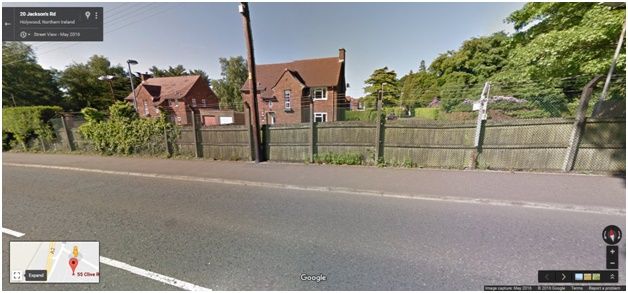
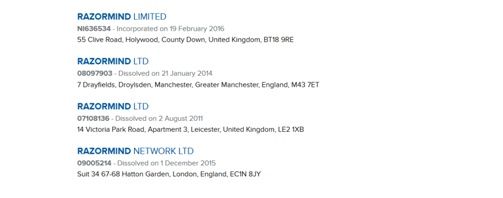
It is worth mentioning a technical background of Jawad. He used terms and technologies, that scammers usually don’t even know. However, we received no specific information and details. For example, despite all our requests to see the code, or at least something that has been already developed we were only offered a voice chat and talk. There was nothing to analyze, although they promised to show parts of the system.
By September 30, we received contact information of a DeOS developer, named Taras, it was the first specific information. Unfortunately, when asking again to get any specific information or details on the code, etc., developers replied only that we can make a call later in the week. We asked to have proof rather than calls and something that can we could study and verify.
On October 2, Jawad Yaqub asked for money back as none of the articles were published, and no banner placed.
He denied all the claims from third parties, but again offered no evidence. To date, there are no specific details or technical explanations of the project on the Razormind site either:

One of the users of Reddit also noted: “A lot of text is stolen from other sites (Fujitsu, Goldman Sachs, IBM…), as everybody can easily verify by googling a few sentences found there.” The text on Razormind site is really taken from other companies. For example, this https://www.razormind.co.uk/deos-open-source/:
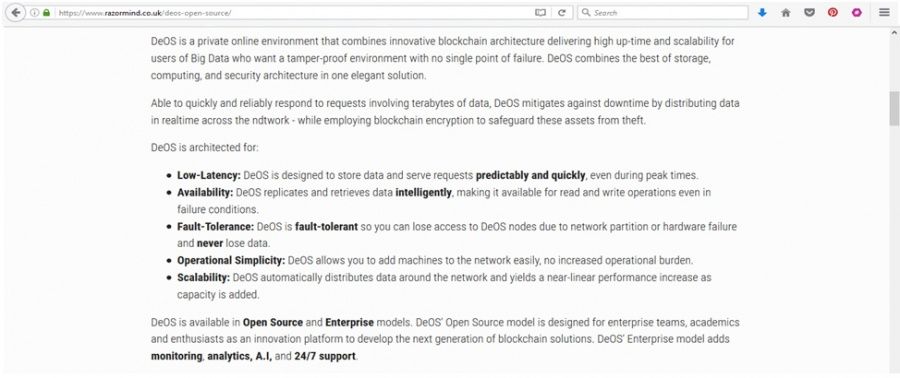
was taken… from:
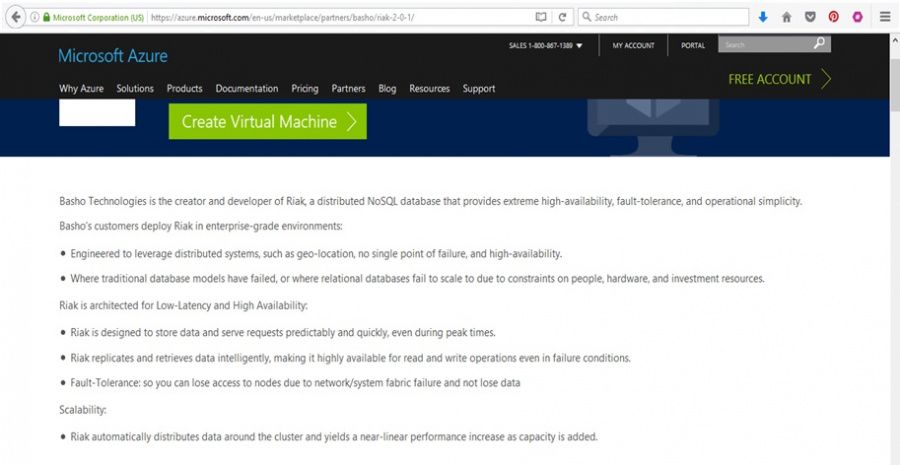
To date, most of this information was cleaned up from Razormind’s web-site and social accounts. However, as you can see from the link below, this in the real information they were using for months in their scam model
Moreover, on October 7, Deos.io has published an article stating that many angry users are now demanding a refund from Razormind. It also said:
“While it is true there is no indication of any sort of block chain code at all, it is quickly becoming clear that Razormind intends to recreate OS.js, a javascript 'operating system' that has been around for a long time already, featuring fancy web widgets that mimic a true OS and using not it's own native blockchain smart assets but essentially worthless Omnilayer assets that anybody can create in minutes. ”
Entering a madhouse
Razormind’s Twitter account was usually full with information not related to the development of the DeOS project. They seem to be more interested in Donald Trump, accusing people, and rather bad jokes, than in Blockchain project development….

However, in November they posted a tweet saying:
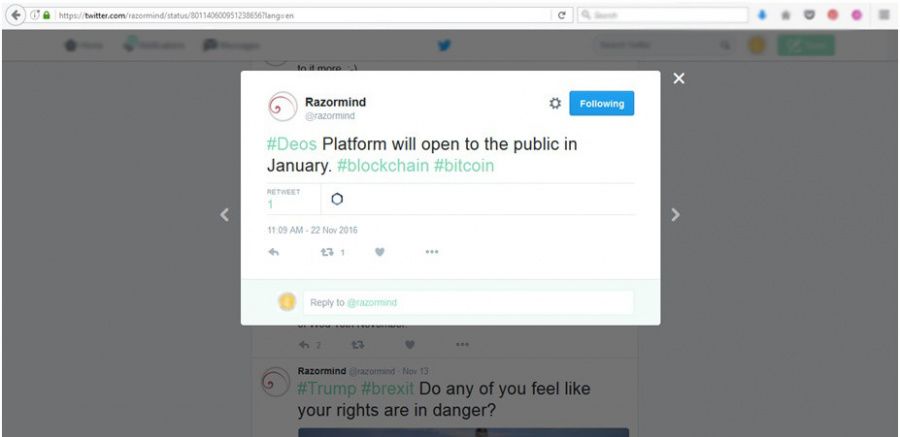
The crowdsale ended September 9, 2016, and according to the article by Deos.io community, the token still has not been delivered. Neither the web-site of Razormind was updated for months since the end of the crowdsale.
In January 2017, Razormind’s twitter got several interesting tweets, like:
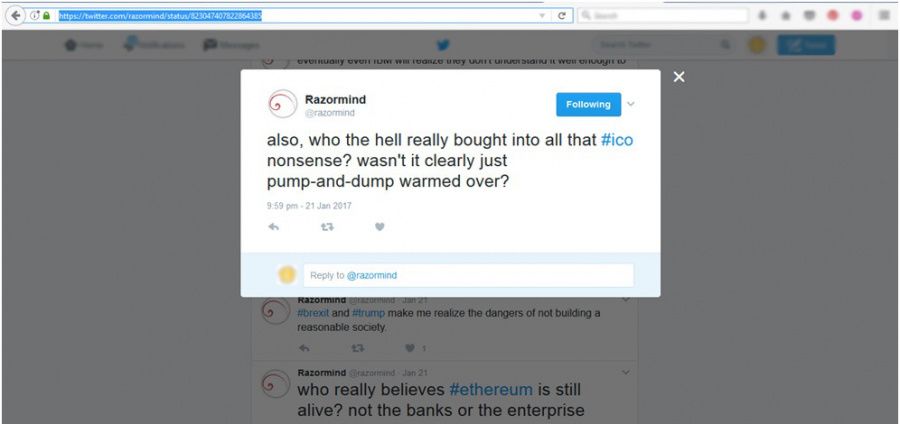
Later another interesting tweet: https://twitter.com/razormind/status/823048426111823873 was published. Seems that it is the first time the team actually tells who “they really are”:
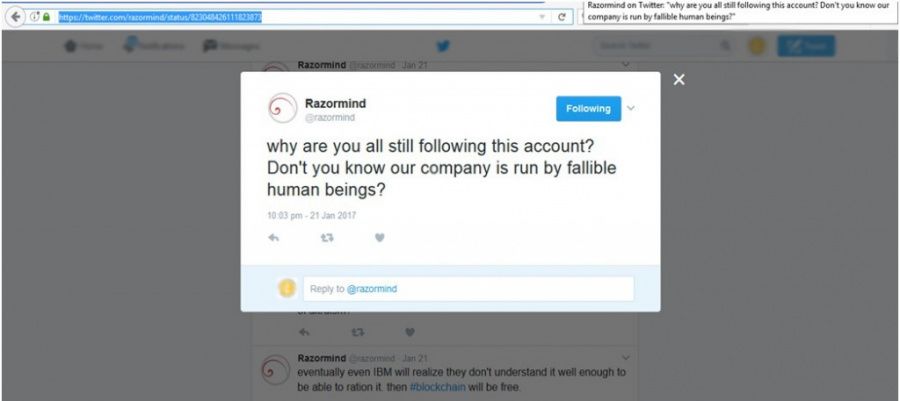
Probably these were tweets from a drunk person, or a bot. But would a company that is developing a complicated Blockchain-based operational system allow a “drunk bot” to post such insane tweets for months?
Latest actions
Even though some of the actions taken by Razormind’s team look strange, according to Twitter again, Razormind started hiring new workers at the end of January 2017:
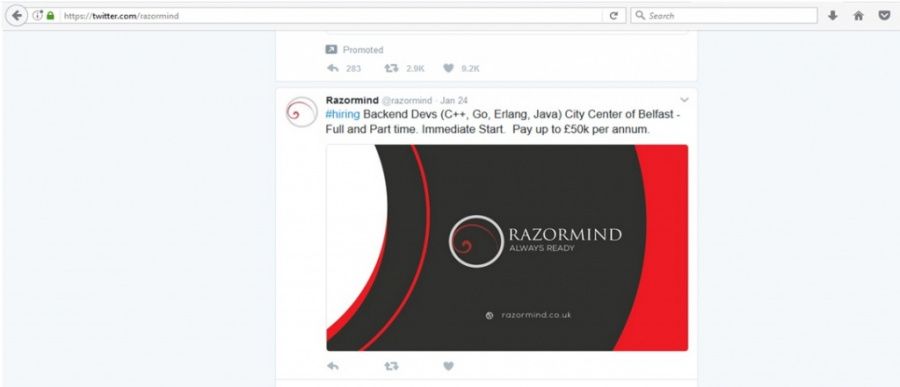
However, on February 6, all the crazy tweets were deleted from Razormind's Twitter account. Same with Facebook. Razormind's web page also was cleaned up, like nothing ever happened. However, we and dozens of users on bitcointalk have copies and screenshots of the promises that Jawad Yakub made earlier.
Experts familiar with the project say:
We decided to speak to Blockchain experts, who have been familiar with Razormind project or its founders.
Lisa Cheng, Founder at Vanbex Group, commented:
“[Ismael Malik] was already working with them. And we were brought in but never interacted with him directly. Razormind is deos. We were on calls together where I was pushing jawad to give us some credible information. Ish, unfortunately, was caught in the crossfire and wasn't involved in the heated arguments I had with Jawad. We basically were asking jawad for proof that he raised as much as he claimed and gave some bogus answer as to why he wasn't able to. I told him we were going to cease all involvement with him unless he was able to verify some facts we needed. In the end, he wasn't able to verify anything.Funny thing is jawad first started talking to me about razor mind and deos over a year ago. I didn't know this guy but I knew that Charles hoskinson talked to him before, so I asked Charles about Jawad and he said the guy seems legit but never worked with him either.”
Charles Hoskinson, former CEO of Ethereum said:
“By all means, if they can read haskell or scala code. Then we'd love the peer review. Jawad has made very bold claims and yet provided no evidence. I'm say jawad reminds me of onecoin. I haven't paid much attention to them documents and claims. I've just interacted with jawad several times and heard about the team size and claims about having a decentralized operating system. I haven't seen a viable whitepaper nor any code. For over 200 people there should be substantial progress. And a very large codebase. Also, that burn rate would be around 1-2 million a month. So jawad would have to have more than 12-24 million in revenue to break even.”
Tim Frost, marketing, business development, and PR professional in the blockchain space, commented to Coinidol.com:
“From what I heard. They ran an ICO with no real product and some partnerships which were not true. You can see lots of info here. This is what someone told me. Vanbex was working with them. They stopped from what I heard. You can ask them as I do not really know. I am trying to stay out of this. For myself, I will stay away. I am glad to help you with contacts, but I know little, and prefer to stay out. So yes I have no proof, just enough for me to stay away. I hope they are legit, I just am not sure.”
Ismail Malik, Founder at BlockchainLab:
“We are doing the Fork of DeOS having lost confidence of Jawads ability to manage the funds and deliver the project as it stands. He has just launched another major scam with DeOS and razormind. 6000 BTC this time, and he did this all through an article on popular news outlet. I think we need to speak urgently so this news outlet can issue a statement. He scammed me also never met him or been paid a single Satoshi's from him.”
Ismail Malik was mentioned as one of the Razormind’s team members for several times. We asked him what kind of a job did he do with Jawad. Jawad once mentioned in a conversation that “we just let Ismail Malik go”, “he was expelled from the project last night” and “he was phoning up members of staff at night and harassing them.”
Ismail Malik replied that it was interesting to hear Jawad speaking about the “team”. Ismail said:
“There is only 1 other staff member Phil Sturgeon. In charge of moving the BTC. So please ask Jawad who is the other staff members that would be interesting to know. Razormind is Aka just Jawad with Phil as the cash mover it's one big scam.”
Another interesting note, on January 10, 2017, Phil Sturgeon filed a back-dated resignation of his position as company secretary for Razormind, as stated on bitcointalk:
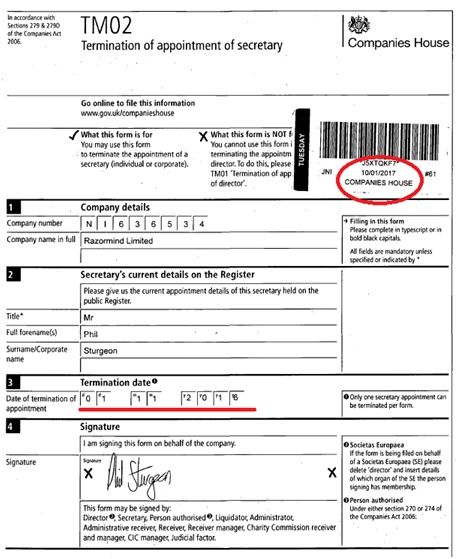
Ismail Malik continued:
“Phil is the guy who cashed out the BTC for Jawad. I have never met Jawad I just leased DeOS.io to him and he scammed me. Jawad asked for me to keep bad press away whilst he launders the BTC into cash I refused. He is a scammer no product no developers nothing's it one big scam. Jawad is going prison very soon he is a known fraudster. That's what I discovered now after investigation.”
Ismail Malik also said: “So Jawad commissioned you to do an article for him paid? And you’re making sure if what Jawad says is true or not? Could you please find out what he means by staff members and who as you can not find evidence of any and can you speak to them to confirm. Can you confirm what he constitutes as harassment and to be specific. Can you also confirm with him directly what he means by at night? If he does not answer or obfuscates the reply then you know you have spoken to guy behind one of the biggest scams in crypto history.
Also, read the article at one popular news outlet original: “27000 users, Top tier banks as clients, Operational DeOS platform in existence, 260 staff, Offices in multiple cities.” - All outright lies. Ask him why has never been seen in public. Why does he not answer those questions?”
Ismail Malik also mentioned that the amounе of money stolen could exceed 6,000 BTC. He said:
“If we add their other scams it could be 10,000s”
Searching for a justice
To date, Razormind still hasn’t issued any tokens. Recently, several users of bitcointalk have sent their claims to the police.
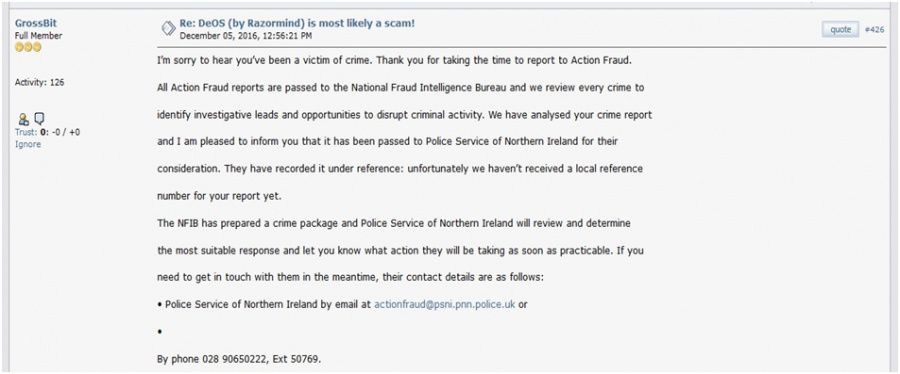
Before you begin to vote
This situation raises two very important philosophical questions, both of which we battle on a weekly basis: Is it okay to scam the scammer and can an industry without law be lawful?
George Gor, CEO and co-founder of Coinidol.com is explaining this public initiative with the words:
“Why is Coinidol.com, Blockchain News Outlet, that has an audience in 174 countries, taking a role of organizer of a public trial? Isn’t it a job for international police? The answer is simple. Blockchain projects got used to self-regulation instead of state regulation. The order is not settled. The biggest project, based on Blockchain technology, known as Bitcoin, is solving every question with public polls. The crypto community votes on what to do about every problem associated with Bitcoin. They don’t attract any authority. Moreover, Bitcoin was created to avoid authorities. Bitcoin is not recognized as a currency in many countries of the world. There are lots of countries where cryptocurrencies are called candy wrappers. Is it right to ask the police to regulate cases, where these candy wrappers were stolen? How do you regulate international scam cases with Bitcoin not in a single country but in the whole world? Why is it not a job for the crypto community? CoinIdol.com wants to set a precedent, of how the community can do it. We are afraid of the results much more than anybody. We are not sure that this is the right way, but someone should dare to be the first.
The second reason, of why mass media should react the first - is the system used by scammers during so-called false ICOs. Scammers and fraudsters turn to different world mass medias, as well as advertising and PR-agencies and ask them to write articles or display banners to advertise them. Often players in the market agree to such jobs without checking all the details, and as a result, help fraudsters steal money from other people's pockets.
Can the whole crypto world set a precedent, when we force scammers, who have stolen up to $10 mln in Bitcoin to pay $1,000 to charity?”
P.S. If you vote to give money to charity, please suggest in the comments below which charity organisation you believe should receive this help.
The team of Coinidol.com has sent the funds of $1000 to the multi-signature address: 3EZ7DhAbwmzx7xFjfyhsoFDA3ZTmy6cQeS. You can follow the movements of these funds after the decision is taken.
News
News
Coin expert

(0 comments)